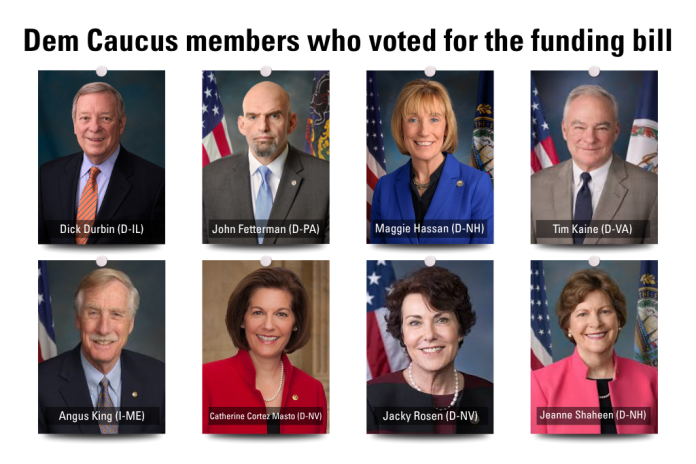The Senate was working to fast-track the stopgap funding deal to reopen the government on Monday after clearing its first procedural hurdle the prior evening.
There was cautious optimism among senators and aides that a bipartisan timing agreement could be reached to bypass what would otherwise be days of procedural hurdles that could further draw out the longest shutdown in history.
Moving to final passage on Monday and sending the measure, which funds the government through January 2026, to the House would require the cooperation of all 100 senators. Otherwise, it could take several additional days and procedural votes until the legislation clears the upper chamber.
Senate Majority Leader John Thune (R-SD) urged senators not to “stand in the way of being able to deliver the relief quickly.”
“The American people have suffered for long enough,” he said. “Let’s not pointlessly drag this bill out.”
After 14 failed votes and 40 days into the shutdown, the Senate overcame a filibuster on Sunday after eight Democrats relented on their healthcare demands to provide Republicans the required 60 votes.
In addition to the short-term funding extension, the deal’s framework included three appropriations bills to fund veterans affairs, agriculture, the legislative branch, and other federal departments. It also includes a vote next month on a bill of Democrats’ choosing to extend expiring Obamacare subsidies that were the cause of the shutdown, an offer Republicans first floated, but Democrats rejected one month ago.
President Donald Trump’s mass federal layoffs during the shutdown will also be reversed as part of the agreement, as well as language barring the administration from doing so again for the duration of the stopgap funding measure.
It was unclear whether Democrats, most of whom vocally opposed the deal because it failed to offer a guaranteed extension of the health insurance credits, would allow the measure to be fast-tracked.

(Grace Hagerman/Washington Examiner)
Republican leadership was working with Sen. Rand Paul (R-KY) on a demand for an amendment vote to roll back an included hemp ban in exchange for not slowing down the legislation’s inevitable passage. Sen. Markwayne Mullin (R-OK), a member of Thune’s leadership team, advocated against what he described as capitulation to Paul with his own vote and suggested it could open the door to more one-off demands from senators before allowing the funding bill to pass.
“I don’t see the point in it,” Mullin said. “If Rand wants to plant his flag and hold the government shut down over hemp in Kentucky, take that fight on. I think he’ll lose that one pretty hard.”
Paul denied the notion that he was causing a delay.
“I am not delaying this bill,” he posted on X. “The timing is already fixed under Senate procedure. My amendment is germane, I’m calling for a simple up & down vote. There is extraneous language in this package that has nothing to do with reopening the government and would harm Kentucky’s hemp farmers and small businesses. Standing up for Kentucky jobs is part of my job.”
There were potential delays from other senators, according to Mullin, such as a demand for a vote to prevent members of Congress from being paid during future shutdowns.
SENATE TAKES FIRST STEP TO REOPEN GOVERNMENT, FUELING DEMOCRATIC SPLIT
House Speaker Mike Johnson (R-LA) has not officially called back representatives in preparation for a vote, an endeavor that could face air travel delays due to administration cuts to air traffic in response to the shutdown. Members will be given an official 36-hour notice after final Senate passage but have been told informally to begin making travel arrangements.
The House has not been in session since Sept. 19, when it passed a short-term funding bill to avert a shutdown.
